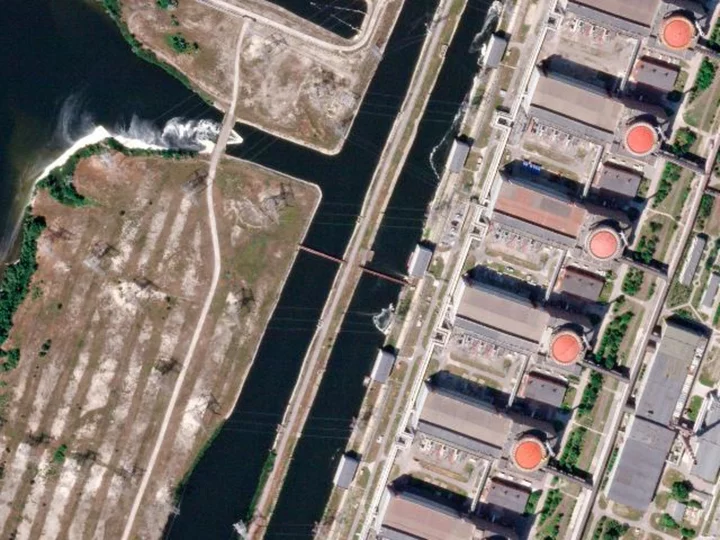The Earth has been hit by a powerful blast of energy from the very depths of the universe. The fast radio burst is the most distant of its kind of ever seen, coming from so far away that it has travelled eight billion years to get to Earth. It is also astonishingly powerful, one of the most energetic of its kind ever seen. In less than a second, it released the same energy that comes out of the Sun in more than 30 years. Fast radio bursts are intense, short bursts of energy that come from unknown but extreme activity in space. Scientists are still unsure of how they are formed, but explanations have included everything from extraterrestrial technology to neutron stars. The newly discovered burst appears to come from a small group of merging galaxies, scientists say, which helps support current theories about where they come from. But the intensity of the burst is harder to explain, which challenges our understanding of how they are actually emitted. “While we still don’t know what causes these massive bursts of energy, the paper confirms that fast radio bursts are common events in the cosmos and that we will be able to use them to detect matter between galaxies, and better understand the structure of the Universe,” said Ryan Shannon, from the Swinburne University of Technology. The blasts could be useful ways of answering some of the deepest questions about our cosmos, such as how much it actually weighs. At the moment, attempts to answer that have led to confusing results. “If we count up the amount of normal matter in the Universe — the atoms that we are all made of — we find that more than half of what should be there today is missing,” said Professor Shannon. “We think that the missing matter is hiding in the space between galaxies, but it may just be so hot and diffuse that it’s impossible to see using normal techniques. “Fast radio bursts sense this ionised material. Even in space that is nearly perfectly empty they can ‘see’ all the electrons, and that allows us to measure how much stuff is between the galaxies.” The blast was spotted last year, using a telescope in Japan. Researchers then used other telescopes to verify the find and examine it in more detail. “Using ASKAP’s array of dishes, we were able to determine precisely where the burst came from,” said Stuart Ryder, the first author on the paper. “Then we used the European Southern Observatory (ESO) Very Large Telescope (VLT) in Chile to search for the source galaxy, finding it to be older and further away than any other FRB source found to date, and likely within a small group of merging galaxies.” The findings are reported in a new paper, ‘A luminous fast radio burst that probes the Universe at redshift 1’, published in the journal Science. Read More Scientists unveil radical new ‘missing law’ to explain the universe India’s Modi declares goal to land human on Moon by 2040 Researchers reveal source of largest ever Mars quake
The Earth has been hit by a powerful blast of energy from the very depths of the universe.
The fast radio burst is the most distant of its kind of ever seen, coming from so far away that it has travelled eight billion years to get to Earth.
It is also astonishingly powerful, one of the most energetic of its kind ever seen. In less than a second, it released the same energy that comes out of the Sun in more than 30 years.
Fast radio bursts are intense, short bursts of energy that come from unknown but extreme activity in space. Scientists are still unsure of how they are formed, but explanations have included everything from extraterrestrial technology to neutron stars.
The newly discovered burst appears to come from a small group of merging galaxies, scientists say, which helps support current theories about where they come from. But the intensity of the burst is harder to explain, which challenges our understanding of how they are actually emitted.
“While we still don’t know what causes these massive bursts of energy, the paper confirms that fast radio bursts are common events in the cosmos and that we will be able to use them to detect matter between galaxies, and better understand the structure of the Universe,” said Ryan Shannon, from the Swinburne University of Technology.
The blasts could be useful ways of answering some of the deepest questions about our cosmos, such as how much it actually weighs. At the moment, attempts to answer that have led to confusing results.
“If we count up the amount of normal matter in the Universe — the atoms that we are all made of — we find that more than half of what should be there today is missing,” said Professor Shannon. “We think that the missing matter is hiding in the space between galaxies, but it may just be so hot and diffuse that it’s impossible to see using normal techniques.
“Fast radio bursts sense this ionised material. Even in space that is nearly perfectly empty they can ‘see’ all the electrons, and that allows us to measure how much stuff is between the galaxies.”
The blast was spotted last year, using a telescope in Japan. Researchers then used other telescopes to verify the find and examine it in more detail.
“Using ASKAP’s array of dishes, we were able to determine precisely where the burst came from,” said Stuart Ryder, the first author on the paper. “Then we used the European Southern Observatory (ESO) Very Large Telescope (VLT) in Chile to search for the source galaxy, finding it to be older and further away than any other FRB source found to date, and likely within a small group of merging galaxies.”
The findings are reported in a new paper, ‘A luminous fast radio burst that probes the Universe at redshift 1’, published in the journal Science.
Read More
Scientists unveil radical new ‘missing law’ to explain the universe
India’s Modi declares goal to land human on Moon by 2040
Researchers reveal source of largest ever Mars quake









